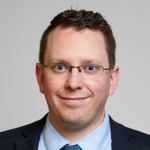Alex is no stranger to Bristol, having carried out his undergraduate in the School of Physics and his PhD in the Electrical and Electronic Engineering Department under the supervision of Prof. John Rarity FRS and Prof. Jeremy O’Brien in what was then called the Centre for Quantum Photonics. During his PhD studies Alex demonstrated the first fiber-integrated controlled-NOT gate and developed photonic crystal fiber sources of photon-pairs. He shared an office with the ‘A-Team’, so called as all their first names began with the letter ‘a’ – Andrew Young, Alberto Politi and Anthony Laing.
After finishing his PhD he moved to the University of Sydney in Australia to work in the Centre for Ultrahigh bandwidth Devices for Optical Systems (CUDOS), where he quickly commandeered a number of classical experiments and pushed them into the quantum regime, leading the Flagship Project on Integrated Quantum Photonics. He won a Discovery Early Career Researcher Award from the Australian Research Council, a three-year independent fellowship to work on quantum frequency conversion.
In 2015 he won a Marie Skłodowska Curie Fellowship to move back to the UK, where he joined the Centre for Cold Matter at Imperial College London, working with Prof. Ed Hinds FRS on coupling cryogenically cooled organic molecules to nanophotonic structures. He then won a Royal Society University Research Fellowship to pioneer a new field of molecular quantum photonics and has built a number of cryogenic confocal microscopes in the process.
Alex is also an integral member of the Quantum Imaging team at Imperial College who are funded by QUANTIC – the UK Quantum Hub for Imaging. He leads the team of researchers working on nonlinear interferometry for quantum imaging without detection, and recently took a system demonstrator of that technology to the UK National Quantum Showcase. As Alex now returns to the University of Bristol he has his sights set on expanding his research further. He will bring new capabilities to QET Labs, such as atomic quantum memories based on warm atomic vapour and laser-cooled atoms, and carbon-based defects in silicon which hold promise as telecommunication band single photon sources. He will also continue to work with organic molecules and would like to return to working on quantum frequency conversion systems in the future.
When asked about the move, Alex said “I am very excited to return to this amazing city and to work under the umbrella of QET Labs, which I see as an incredibly dynamic and successful group of researchers.” Alex starts on 1st December this year, so you’ll be seeing a lot more of him around campus soon.
